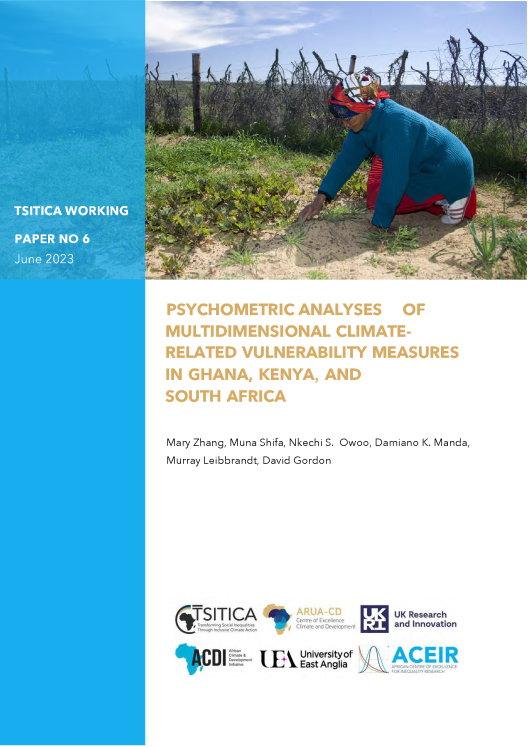Psychometric analyses of multidimensional climate-related vulnerability measures in Ghana, Kenya, and South Africa
Mary Zhang, Muna Shifa, Nkechi S. Owoo, Damiano K. Manda, Murray Leibbrandt, David Gordon
TSITICA Project Working Paper no. 6, June 2023.
Published by ARUA Centre of Excellence in Climate Change and Development & African Centre of Excellence for Inequality Research.

People in vulnerable situations are disproportionately affected by climate change. Nonetheless, the majority of available climate-related multidimensional vulnerability indicators and assessments are at the national or regional level, with individual and household level disparities not being fully considered. The objectives of this paper are twofold: first, the authors analyse climate-related multidimensional vulnerability measurements, focusing on individual and household characteristics in Ghana, Kenya, and South Africa; second, they examine the psychometrics analyses of the indicators to evaluate their reliability and validity in terms of measuring multidimensional climate-related vulnerability across the three countries. The multidimensional vulnerability analysis demonstrates that poor and rural households are more likely to be vulnerable to climate-related impacts in all three countries. Although the primary indicators driving overall multidimensional vulnerability varies among the three countries, employment type, access to basic services, food insecurity, and demographic factors are all important factors in the three countries. The psychometrics analyses of the indicators demonstrated that lack of access to safe water and sanitation and food insecurity were reliable and valid climate vulnerability indicators across the three countries. Read more
TSITICA was a collaborative, multi-country interdisciplinary research project. It brought together two ARUA Centres of Excellence with researchers from the universities of Ghana, Nairobi and Cape Town, and from the UK universities of Bristol, East Anglia and Manchester and the London School of Economics. The support of the African Research Universities Alliance and UK Research and Innovation are gratefully acknowledged. Visit project website.
